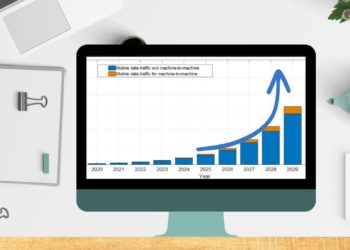The rapid growth of big data and data analytics is transforming the way businesses operate, providing insights that were once available only to large corporations. Waqas Khan Pitafi, a visionary entrepreneur and advocate for data-driven business strategies, has long emphasized the value of big data for companies of all sizes. According to Pitafi, even small businesses can unlock significant growth and competitive advantages by leveraging big data insights. By adopting data-driven approaches, small businesses can make better decisions, optimize operations, and deliver enhanced customer experiences.
In this article, we explore why big data is a game-changer for small businesses, the benefits it offers, and practical strategies to leverage data effectively.
Understanding Big Data and Its Relevance for Small Businesses
Big data refers to the massive volumes of structured and unstructured data generated from various sources, including customer interactions, social media, transactions, and more. With advancements in data analytics, artificial intelligence, and machine learning, businesses can analyze this data to identify patterns, trends, and insights that drive decision-making.
For small businesses, the ability to harness big data can provide a competitive edge in today’s data-driven world. With the right tools and strategies, small businesses can use big data to gain a deeper understanding of customer preferences, optimize supply chains, and forecast future demand with greater accuracy. Access to big data allows small businesses to compete more effectively against larger firms, aligning their operations with market demands and improving customer satisfaction.
Benefits of Big Data for Small Businesses
The impact of big data on small businesses is significant. Let’s explore some of the core benefits that data-driven insights offer to small businesses:
1. Improved Decision-Making
One of the biggest advantages of big data is its potential to enhance decision-making. By analyzing data from multiple sources, small businesses can make informed decisions based on real-time insights rather than relying solely on intuition. For example, data analytics can help small businesses identify peak sales periods, understand customer demographics, and analyze product performance.
Access to data-driven insights enables small businesses to make strategic choices, such as which products to promote, when to launch marketing campaigns, or how to optimize pricing. With data-driven decision-making, small businesses can make adjustments quickly and proactively address emerging trends in the market.
2. Enhanced Customer Understanding and Personalization
Big data provides valuable insights into customer behavior, preferences, and purchase history. By analyzing this data, small businesses can create detailed customer profiles, allowing for more personalized marketing efforts. Personalization is a key driver of customer loyalty, as it makes customers feel understood and valued.
For instance, e-commerce stores can use customer data to offer product recommendations based on past purchases or browsing behavior. Retailers can also analyze purchase history to design loyalty programs that reward frequent buyers. By personalizing experiences, small businesses can improve customer engagement, build lasting relationships, and drive repeat business.
3. Optimized Operations and Cost Savings
Big data is instrumental in optimizing operational efficiency. By analyzing sales data, inventory levels, and supply chain information, small businesses can identify inefficiencies and implement cost-saving measures. For example, a small business can monitor inventory turnover rates to avoid overstocking or stockouts, which can lead to reduced carrying costs and improved cash flow.
In addition, data analytics can reveal patterns that inform better resource allocation. For example, if a business notices that certain products perform well during specific times of the year, they can plan production schedules accordingly. Through these insights, small businesses can optimize their operations and reduce operational costs.
4. Predictive Analytics for Better Forecasting
Big data enables small businesses to adopt predictive analytics, which uses historical data to forecast future trends. Predictive analytics can help small businesses anticipate demand, allocate resources effectively, and prepare for seasonal fluctuations. For example, by analyzing past sales trends, a small business can predict demand for popular products during peak seasons and adjust inventory levels accordingly.
Forecasting demand accurately is crucial for small businesses with limited resources, as it helps avoid both overproduction and underproduction. Predictive analytics also allows small businesses to respond to market changes more effectively, giving them a competitive advantage in a dynamic environment.
5. Enhanced Marketing Strategies
Data-driven marketing strategies can significantly improve the effectiveness of promotional campaigns. By analyzing customer data, such as purchase history, browsing behavior, and demographic information, small businesses can create targeted marketing campaigns that resonate with their audience.
For example, data analytics can help identify high-value customers who are more likely to make repeat purchases. By focusing marketing efforts on these customers, small businesses can increase their return on investment (ROI) and build a loyal customer base. Additionally, data insights can help optimize digital advertising, such as selecting the right keywords for search engine marketing or targeting ads based on customer interests and preferences.
6. Competitive Advantage
Big data provides small businesses with a competitive advantage by enabling them to act on data insights quickly. While larger companies may have more resources, small businesses can leverage their agility to respond to market trends and customer needs in real-time. For instance, a small business can use social media data to monitor customer sentiment and adjust marketing strategies based on customer feedback.
Additionally, small businesses can analyze competitor data to understand industry trends and identify potential opportunities. By staying informed of competitors’ moves and market dynamics, small businesses can adapt their strategies to remain competitive and capture a larger share of the market.
Practical Steps for Small Businesses to Leverage Big Data
While the benefits of big data are clear, small businesses may face challenges in implementing data-driven practices due to limited resources. Here are practical steps small businesses can take to leverage big data effectively:
1. Define Clear Objectives
Before implementing a data strategy, it’s essential to define clear business objectives. For example, a small business may aim to improve customer retention, reduce operational costs, or increase sales. By identifying specific goals, businesses can focus on collecting and analyzing data that aligns with these objectives.
Clear objectives also make it easier to measure the success of data initiatives and demonstrate the ROI of big data investments.
2. Start with Readily Available Data Sources
Small businesses may not have access to extensive data resources like large corporations, but they can start by analyzing data from existing sources. These may include sales records, customer feedback, website analytics, and social media interactions. These data sources provide valuable insights and serve as a foundation for more advanced data analytics efforts.
For instance, a business can analyze website traffic data to understand user behavior, such as which pages are visited most frequently or where users tend to exit the site. These insights can inform decisions on website design, content, and user experience.
3. Leverage Cloud-Based Data Analytics Tools
Many cloud-based data analytics tools are designed for small businesses and offer affordable, user-friendly solutions. Tools like Google Analytics, Tableau, and Microsoft Power BI enable businesses to collect, visualize, and analyze data without the need for complex infrastructure. These tools are scalable, allowing businesses to grow their data capabilities as they expand.
Additionally, cloud-based tools provide access to advanced analytics features, such as data visualization and machine learning, making it easier for small businesses to derive actionable insights from data.
4. Integrate Data Across Channels
To get a holistic view of their business, small businesses should integrate data across different channels, such as sales, customer service, social media, and inventory. Integrating data allows businesses to see correlations and patterns across departments, which can reveal valuable insights.
For example, integrating customer service data with sales data can help identify common customer complaints and product issues, enabling proactive solutions. By connecting data from multiple channels, small businesses can develop a comprehensive understanding of their operations.
5. Prioritize Data Security and Privacy
As small businesses begin to work with big data, it is crucial to prioritize data security and privacy. Protecting customer information builds trust and ensures compliance with data protection regulations. Small businesses should implement data security measures, such as encryption, access controls, and regular security audits, to safeguard sensitive data.
Additionally, respecting customer privacy by being transparent about data collection practices fosters trust and can enhance customer loyalty.
6. Invest in Data Literacy and Training
To make the most of big data, it’s essential for employees to understand how to interpret and act on data insights. Small businesses can invest in training programs to improve data literacy among team members. When employees at all levels are comfortable with data, they are more likely to embrace data-driven practices and contribute valuable insights.
Training sessions, online courses, and workshops on data analytics can empower employees to use data in their day-to-day decision-making. By fostering a data-driven culture, small businesses can make data analytics a core part of their operations.
Big Data as a Catalyst for Growth in Small Businesses
Big data has become an invaluable asset for small businesses seeking growth and efficiency in a competitive market. By offering insights into customer behavior, operational efficiencies, and market trends, big data allows small businesses to make strategic decisions, optimize resources, and stay ahead of the competition. With the guidance of entrepreneurs like Waqas Khan Pitafi, who champion data-driven approaches, small businesses are better positioned to use data as a strategic advantage.
By starting with accessible data sources, utilizing affordable tools, and fostering a data-literate culture, small businesses can harness the power of big data without breaking the bank. As the digital landscape continues to evolve, the role of big data in empowering small businesses will only grow, enabling them to thrive in an increasingly data-driven world.











































































